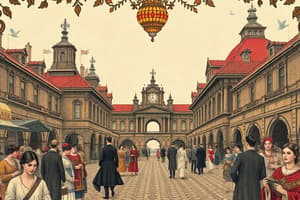Podcast
Questions and Answers
What is the primary goal of studying history?
What is the primary goal of studying history?
- To analyze only the economic aspects of societies
- To focus on the lives of famous individuals
- To memorize dates and events
- To understand the present by studying the past (correct)
Which branch of history examines the everyday lives of ordinary people?
Which branch of history examines the everyday lives of ordinary people?
- Cultural History
- Social History (correct)
- Political History
- Economic History
What is the term for understanding the sequence of events in the past?
What is the term for understanding the sequence of events in the past?
- Chronology (correct)
- Causation
- Empathy
- Change and Continuity
What type of historical source is an original document from the time period?
What type of historical source is an original document from the time period?
What historical thinking concept involves evaluating the importance of historical events?
What historical thinking concept involves evaluating the importance of historical events?
Why is studying history important for developing critical thinking skills?
Why is studying history important for developing critical thinking skills?
What branch of history analyzes the development of economic systems, trade, and commerce?
What branch of history analyzes the development of economic systems, trade, and commerce?
What is the term for understanding the perspectives and experiences of people in the past?
What is the term for understanding the perspectives and experiences of people in the past?
Who was president during the Civil War began?
Who was president during the Civil War began?
Flashcards are hidden until you start studying
Study Notes
History in Social Studies
What is History?
- The study of past human events, societies, and cultures
- Examines the development and growth of human societies over time
- Aims to understand the present by studying the past
Branches of History
- Political History: Studies the development of governments, institutions, and politics
- Social History: Examines the everyday lives, experiences, and cultures of ordinary people
- Economic History: Analyzes the development of economic systems, trade, and commerce
- Cultural History: Explores the arts, literature, and intellectual developments of a society
Historical Skills
- Chronology: Understanding the sequence of events in the past
- Causation: Identifying the causes and consequences of historical events
- Change and Continuity: Analyzing how societies change and remain the same over time
- Empathy: Understanding the perspectives and experiences of people in the past
Historical Sources
- Primary Sources: Original materials from the time period, such as documents, images, and artifacts
- Secondary Sources: Interpretations and analyses of primary sources, such as textbooks and articles
- Oral Histories: Personal accounts and testimonies of individuals who experienced historical events
Historical Thinking Concepts
- Significance: Evaluating the importance and impact of historical events
- Perspective: Considering multiple viewpoints and biases in historical accounts
- Evidence: Analyzing and interpreting historical sources to support claims
- Continuity and Change: Identifying patterns and developments over time
Why Study History?
- Understanding the Present: Learning from the past to inform decisions and actions in the present
- Cultural Awareness: Appreciating the diversity of human experiences and cultures
- Critical Thinking: Developing skills in analysis, evaluation, and problem-solving
History in Social Studies
What is History?
- History is the study of past human events, societies, and cultures to understand the present
- It examines the development and growth of human societies over time
Branches of History
Political History
- Studies development of governments, institutions, and politics
Social History
- Examines everyday lives, experiences, and cultures of ordinary people
Economic History
- Analyzes development of economic systems, trade, and commerce
Cultural History
- Explores arts, literature, and intellectual developments of a society
Historical Skills
Chronology
- Understanding sequence of events in the past
Causation
- Identifying causes and consequences of historical events
Change and Continuity
- Analyzing how societies change and remain the same over time
Empathy
- Understanding perspectives and experiences of people in the past
Historical Sources
Primary Sources
- Original materials from the time period, such as documents, images, and artifacts
Secondary Sources
- Interpretations and analyses of primary sources, such as textbooks and articles
Oral Histories
- Personal accounts and testimonies of individuals who experienced historical events
Historical Thinking Concepts
Significance
- Evaluating importance and impact of historical events
Perspective
- Considering multiple viewpoints and biases in historical accounts
Evidence
- Analyzing and interpreting historical sources to support claims
Continuity and Change
- Identifying patterns and developments over time
Why Study History?
- Understanding the present by learning from the past
- Appreciating diversity of human experiences and cultures
- Developing skills in analysis, evaluation, and problem-solving
Studying That Suits You
Use AI to generate personalized quizzes and flashcards to suit your learning preferences.




